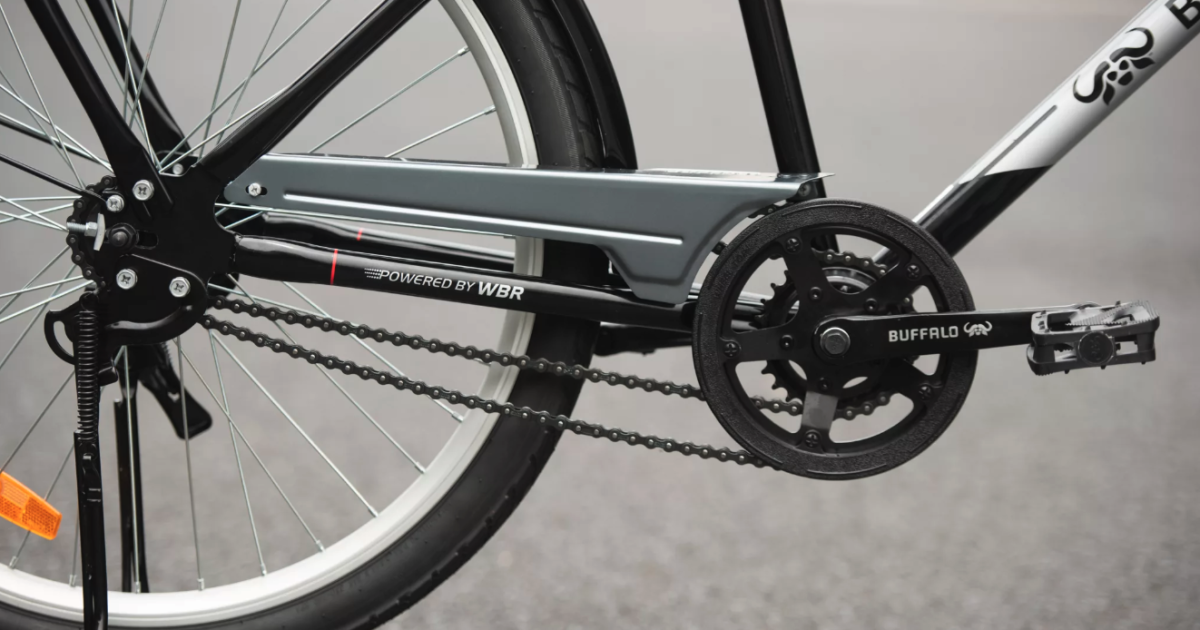- cross-posted to:
- micromobility@lemmy.world
- cross-posted to:
- micromobility@lemmy.world
World Bicycle Relief explains that its Buffalo bicycles are designed to be “extremely durable to serve the needs of people who travel long distances over rugged terrain with heavy cargo in some of the world’s harshest environments.” With that in mind, simplicity and ruggedness are absolutely critical, and the redundant chain system is designed to provide a high/low gear solution that involves as few breakable, externally mounted parts as possible. These bikes are being delivered to places that don’t have access to bicycle shops or spare part overnighting, so making something that’s as tough and easy to repair as possible is an essential part of WBR’s job.
I don’t mean to brag, but I read the article. All the comments talking about chain breaking are missing the actual point. The original bike was a fixed gear. Having two chains allows this model to have 2 gears to aid with hills or carrying cargo.
Why 2 chains you ask? Imagine you wanted to have a two gear bike with as few moving parts as possible. Chain repair is also relatively easy with a simple tool.
Apparently they avoid even the cables.
the rider simply backpedals half a revolution to activate the switchable freewheel from high to low and vice versa
I have doubts about how that behaves going down a slope, I would like to see it in action.
(Edit: Reword)
And redundancy, if one chain breaks you can still get home (or to someone with tools) and repair
Kickback-shifted hubs and coaster brakes have been a thing absolutely forever and they all perform perfectly fine downhill, not sure why this would be any different!
Ok, that’s pretty cool. Why not a gearbox though? Weight, maybe?
Presumable complexity and therefore cost and reliability, but given the simplicity and mature robustness of 2 and 3 speed hubs I’m a little surprised this is truly superior and worthwhile.
The problem is controlling the gearbox. In order to do that you need lots of parts from steel cables to crimps (that go on the ends of said cables) to derailleurs to levers and shifters and lots of other things to route the cables.
By only having two gears–and a simple mechanism to switch between them–this bike is able to avoid all that complexity. Not to mention the tools needed to repair said complexity.
A chain link remover is a tiny little thing that can be strapped (or taped) in a pouch and kept on the bike along with extra (tiny) chain links.
The thing they really need to work on next is the tubes. When I was really big into mountain biking I never had to repair my chain but I always carried two extra tubes (and a pump!) when riding because I had two flats on long rides more than once.
It’s an interesting design – and patented. If WBR really wants to have a big impact in the global South, they should release design with open, inclusive licensing so that entrepreneurs in the global South can manufacture it locally, without relying on imported hubs.
The article only mentions US patent. Hopefully that is mainly to preserve their IP in the US and later perhaps few other high income countries.
The global south will come up with diy knockoffs in an eye blink if WBR tries to make it too expensive to manufacture locally.
These bikes are awesome, I kind of don’t get this as a reliability plus but it must work because from what I’ve seen these bikes are unstoppable
showed this to a friend and he mentioned that this could be good for mid-drive ebikes too, it seems really cool and burly. But it’s patented, really??
Unfortunately, if they don’t patent it, someone else will and charge royalties.
That mistake has been made with life saving vaccines and other treatments before.
Now you get to deal with chain stretch on two separate chains without a way to properly tension the longer one.
It’s a tradeoff. Worry about a derailleur in rural Africa, or maybe have a chain issue.
But from what I understand, it runs like a single speed bike, so chain wear would be at 1%, possibility after thousands of KM.
I think it’s a better system than what’s currently available to riders in those areas.
When I was using my fixed gear bike for my daily commute (30km+) it took a long time for my chain to stretch by a little and it took much more constraints than a single speed gear, I wouldn’t be really concerned about this
And the chain has to be quite loose on a single speed for it to fall compared to bikes with derailleur
Use a belt drive instead. They are super strong and dont get elongated over time.
Otherwise use a shaft driven axle with oil submerged gears. That shit never breaksEdit: i don’t understand why people down vote? A well maintained bike chain can only run between 3000-8000 km at best and that’s under good conditions. A belt drive can easily run 20.000 km and some stories of over 40.000 km and can run In mud and snow without trouble. It does not need any lubricant and only a little water to clean it now and then.
For shaft systems i see that they are less developed for bicykles. On motorbikes it’s more common and it never breaks.
Source for 40.000 km on a belt drive: https://www.cyclingabout.com/belt-drive-better-than-chain-drive-bicycles/
___sounds expensive
A bit up front yes, but you can drive over 15.000 - 30.000km on a belt set with very little to no maintenance. And the price for belt drive is still coming down and is really price competitive already. I have belt drive on my bike and have done nothing to it at all for 3000 km and it still runs smoothly.
You have to put it into context: these bikes are going to some of the most remote, poor parts of the world. How many belt drive dealers would someone run across in that situation?
And even if they last 30,000 km, what happens when they finally do need to be replaced? You need a split frame, which this particular bike can’t do without madding massive costs and introducing more things to break.
A single speed bike chain is very easy to find, dirty cheap, and last a very respectable amount of time.
The people using these bikes are in a “if it isn’t broke, don’t fix it” situation, and the previous model of this bike (true single speed) was working great for them. This very simple upgrade gives them a considerable amount of versatility.
Adding one more gear to a single speed belt drive bike would just make these unaffordable for the charity giving them to these people. And it would likely leave many of them stuck once maintenance finally has to be done.
Totally fair points. But if it is supposed to be for poor areas patenting the system seems like a counter productive choice. Yes chains are cheap but so would a new manufacturing process for belt drives be. The gears for belt drive can be cast from composite plastics making them relatively cheap. Old fasion belt splicing kits exist as well and could be implemented if you really wanted to avoid the split frame or they could develop a simple split frame conversion kit where you can cut out a section and clamp it back together with a bracket. It doesn’t have to as complicated as one might think. Most of the conversion kits today are expensive because they also needs to look good and fancy, but for rural areas funktion is king and it could be made much simpler with two bracket and 6 bolts clamping the frame together. I just belive that belt has a lot more potential because it is really really durable and good for harsh environments with no lubricant needed.
Never seen a shaft driven axle used in those conditions, I’ve only seen it in a city where the roads are smooth
Fair point
Sounds like a bad idea? They can buy normal bike chains, yes. Normally it would make more sense to use rough
MTBBMX chains or so.But I doubt that the 2 chains will use up evenly
MTB chains are finer as they are made for multiple gear systems.
BMX chains are stronger immo which is the type of chain you usually use on single speed
Oh I meant BMX chains.










